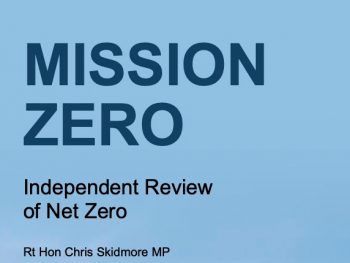Net Zero Review calls for urgent ZEV mandate delivery and charge point VAT rethink
The UK needs to adopt a “new approach” to reach net zero carbon emissions by 2050, including swift work to implement the ZEV mandate and to cut public charge point VAT to drive EV adoption.

The 340-page review warns the Government must do more to reap the economic benefits of green growth as it highlights areas where the UK is lagging behind
Published by former Energy Minister Chris Skidmore, the 340-page ‘Mission Zero’ report warns that the Government must do more to reap the economic benefits of green growth as it highlights areas where the UK is lagging behind.
Skidmore, the review chair, warned the UK has ”reached a tipping point” and that the “risks of ‘not zero’ are now greater than the associated risks of taking decisive action on Net Zero now”.
Commissioned by the Government last autumn, the document makes 129 recommendations designed to maximise economic investment, opportunities and jobs while working towards achieving legally binding targets, across a wide range of areas.
It includes a host of recommendations impacting those across automotive, fleet and transport. Key measures that have been called for include swift delivery of the ZEV mandate, which was announced in the October 2021 Net Zero Strategy and is due to apply from 2024, but has still not been detailed. The report adds that this needs to be balanced with maintaining regulations and funding to support the uptake of electric and other zero emission vehicles, and continuing to drive emission reductions from internal combustion engines.
The report also calls on the Government to equalise VAT on public and private electric vehicle charging in 2024 – a move that campaign groups include FairCharge, backed by the RAC, have been calling for over the last year but the Government had previously rejected.
Other transport-related proposals include:
- Joint government and industry work to set out a clear programme by 2024 to accelerate decarbonisation of the wider freight sector through modal shift and deployment of new technologies, building on the Future of Freight Plan
- The Government to reduce delays to anticipated reforms by bringing forward the delayed Future of Transport Bill this Parliament.
- By autumn 2023, HM Treasury should review how policy incentivises investment in decarbonisation, including via the tax system and capital allowances
- Government to publish the Low Carbon Fuels Strategy in 2023
- Work to help drive the choice of active travel or public transport, or using shared services, and cut the costs of public transport
- Enable the provision of long-term finance, required for initiatives to decarbonise the existing transport fleet
That’s alongside work needed in other areas including farming, housing and energy generation.
Skidmore said the UK should be proud of the lead it has taken in tackling climate change, but stressed the areas where government policy is lacking. He also promoted the opportunities for “strong economic growth”.
He added: “My recommendations are designed to make the most of this historic opportunity, covering the length and breadth of our economy, so that people in every part of the country can reap the benefits of this both in their communities, and in their pockets.”
Business and Energy Secretary Grant Shapps commented: “With a wealth of talent and expertise, and a track record to be proud of, the UK is well placed to ensure that tackling climate change also brings new jobs and investment for businesses and communities.
“I am grateful to Chris Skidmore – the man who signed our climate commitments into law – for his detailed report, which offers a range of ideas and innovations for us to consider as we work to grasp the opportunities from green growth.”
Scale of review “shows positive ambitions of UK”
The BVRLA welcomed the publication of the review and stressed the need for continued public and private sector collaboration to achieving its ambitions. T
Gerry Keaney, chief executive, said: ”The sheer scale, depth and ambition of the Net Zero Review demonstrates the importance of this topic. Decarbonisation is not a choice. The review should be taken seriously by companies and governmental departments in every sector. Led by fleet, the automotive sector has long been a trailblazer in decarbonisation.
“The gaps between the recommendations being published today and their ultimate transition into government policy will vary in size. Processes are complex and departments will need to come together to drive progress. Today’s review represents a monumental step forward. We will continue to actively engage with all stakeholders to represent the sector’s views and contribute to positive change.”
Zemo Partnership, formerly the LowCVP and working to accelerate transport to zero-emissions, was involved in the report and welcomed the findings that Government needs to set clear, robust and consistent policies and rapidly implement them if we are to reap the full benefits from this transition
Chief executive Andy Eastlake said: “The report makes clear that working in partnership across sectors and well beyond existing silos will be required…it also highlights that the public need to be properly informed so we can move forward together on this journey; both areas in which Zemo has specialised and focused efforts and resources over the last 20 years.
“The Net Zero Review shows that we are heading in the right direction but also that we urgently need to step up the pace as well as bring everyone along with us.”
To access the full review, click here.












